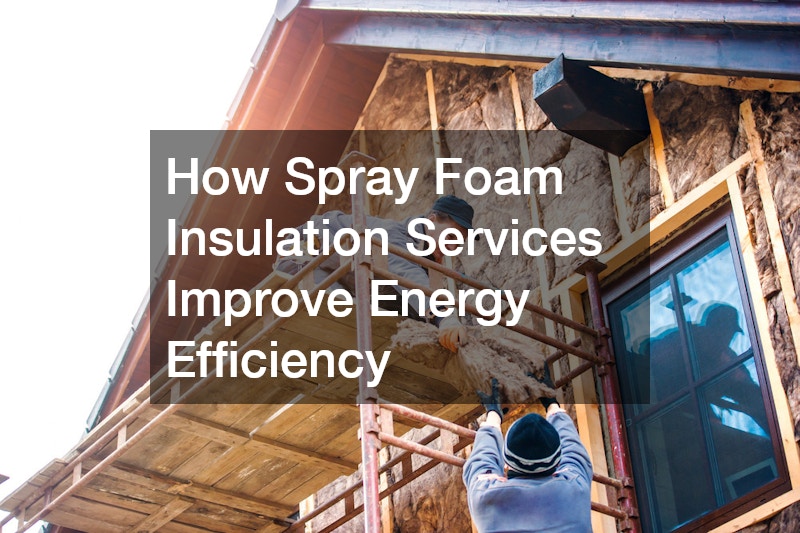In the quest for enhancing energy efficiency in residential and commercial buildings, spray foam insulation services have emerged as a leading solution. As energy costs continue to rise, homeowners and business owners alike are seeking methods to reduce their utility bills while improving the comfort of their spaces. This demand has led many to consider spray foam insulation as a viable long-term investment.
Spray foam insulation is becoming an increasingly popular choice due to its ability to create an effective barrier against the external environment. It aids in reducing energy consumption by sealing air leaks and providing superior thermal insulation. This article delves into how spray foam insulation contribute to greater energy efficiency, ultimately leading to cost savings and increased environmental sustainability.
Understanding the benefits of spray foam can help property owners make informed decisions about their insulation needs. By examining the mechanics of spray foam insulation and its impact on energy performance, individuals can better evaluate the potential return on investment. In the following sections, we will explore the various advantages of integrating spray foam insulation into building projects.
The Mechanics of Spray Foam Insulation
Spray foam insulation services utilize a form of insulation that expands upon application, filling gaps and creating an airtight seal. This process prevents air infiltration and exfiltration, which are primary contributors to energy loss in buildings. As the foam expands, it conforms to the surfaces, ensuring that the entire space is insulated without leaving any voids.
The foam is typically made from polyurethane and is applied using specialized equipment by professionals trained in spray foam insulation. It comes in two main types: open-cell and closed-cell, each having distinct properties and advantages. Open-cell foam is softer and provides excellent sound absorption, while closed-cell foam is denser and offers greater resistance to moisture and vapor infiltration.
By choosing spray foam, homeowners benefit from improved thermal resistance, also known as R-value, compared to traditional insulation materials such as fiberglass or cellulose. This higher R-value results in superior energy efficiency, as the reduction in thermal bridging helps maintain consistent indoor temperatures. Consequently, the reliance on heating and cooling systems is minimized, lowering energy consumption.
Benefits
One of the primary benefits is the substantial reduction in energy bills. By precisely controlling indoor climate conditions, spray foam reduces the strain on HVAC systems. The cost savings achieved through decreased utility bills quickly offset the initial investment in spray foam installation.
Spray foam insulation enhances indoor air quality by minimizing the entry of allergens, pollutants, and outdoor air contaminants. This makes it an ideal solution for households with allergy sufferers or individuals sensitive to environmental changes. Spray foam insulation services can help create a healthier and more comfortable living environment, promoting overall well-being.
Another advantage is the material’s longevity and durability. Unlike traditional insulation that may degrade over time, spray foam maintains its integrity, ensuring persistent performance. This long-lasting nature further amplifies its cost-effectiveness by eliminating the need for frequent replacements or maintenance.
Environmental Impact and Sustainability
Through reducing energy consumption, spray foam insulation services directly contribute to lowering carbon footprints of buildings. By decreasing the reliance on fossil fuels for heating and cooling, buildings become more sustainable. This is a crucial consideration for those looking to enhance their environmental responsibility.
Additionally, the use helps to cut down on waste typically associated with other types of insulation. Its durability and minimal replacement needs mean fewer resources are consumed over time. This aligns with global efforts towards sustainable construction and responsible resource management.
Furthermore, the installed product is usually devoid of formaldehyde, a harmful chemical frequently found in building products. By selecting spray foam, occupants can enjoy improved air quality without worrying about the detrimental effects of volatile organic compounds. Thus, spray foam insulation stands as a step towards building safer, eco-friendly spaces.
In conclusion, spray foam insulation offer a multitude of advantages that align with modern energy efficiency goals. The enhanced thermal barrier, reduced energy bills, and improved indoor air quality make it a superior choice compared to traditional insulation methods. Property owners seeking to maximize their energy savings while contributing to environmental sustainability should consider this advanced insulation technology.
By focusing on reducing energy consumption, spray foam not only benefits individual homeowners but also makes a positive impact on global energy resources. As the demand for eco-friendly and cost-effective building solutions grows, spray foam insulation is poised to remain at the forefront of energy-efficient construction practices. Its enduring performance and environmental benefits resonate with the increasing awareness of sustainable living.
Ultimately, investing in spray foam insulation services is a prudent decision for anyone looking to enhance the efficiency and comfort of their spaces. The comprehensive benefits and long-term savings underscore its value, and as more people adopt this innovation, they contribute significantly to a more sustainable future. Thus, spray foam insulation represents not just an improvement but a commitment to a better, more energy-conscious world.





